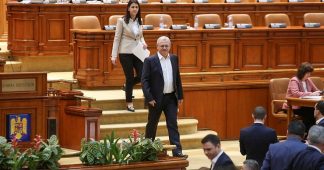A new Romanian radical right party is resurrecting Romania’s interwar fascism
By22 December 2020
One of the big surprises of the Romanian elections in December 2020, was the stunning success of the Alliance for the Unification of Romanians (AUR), a new party on the radical right whose acronym means ‘gold’ in Romanian. The party, led by George Simion and Claudiu Târziu, was founded in September 2019. The party won 8.69% of the votes for the Chamber of Deputies and 8.77% of the Senate, making it the fourth largest party in the country now.
Despite a strong shift against the ruling National Liberal Party (PNL), the government should be able to remain in power by entering into a coalition with the Save Romania Union (USR) after an election in which just under 33% of eligible voters participated. Romania has not had a strong right-wing party since the death of Corneliu Vadim Tudor in 2015, making it an unusual exception in a region where more and more voters are moving steadily towards the radical right.
‘Family, Fatherland, Faith, and Freedom’
The party lists ‘Family, Fatherland, Faith, and Freedom’ as the four ‘pillars’ of its program, but it is mostly known within Romania for demanding the unification of Romania and Moldova, the abolition of same-sex marriage, anti-Hungarian rhetoric, and hostility towards masks and COVID-19 restrictions.
George Simion, AUR’s most recognisable figure, has spent the past fifteen years provoking conflicts with the neighbouring country of Moldova by leading protests in Romanian-speaking schools and organising rallies demanding that Moldova unite with Romania as a single country. He is currently under a five-year ban preventing him from entering Moldova.
Simion’s co-president, Claudiu Târziu, played a leading role in the Coalition for the Family movement, whose activism led to a referendum in 2018 on changing the constitution to prohibit same-sex marriage. The proposed change failed to pass because voter turnout was too low. Another of the party’s leading figures, Dan Tănasă, was involved in provoking ethnic violence between Romanian and Hungarian communities over a World War I cemetery in June 2019.
Diana Ivanovici-Șoșoacă, who is one of the new AUR senators, also rose to celebrity in October 2020 as a prominent opponent of mandatory mask-wearing following COVID-19 restrictions. In addition to leading rallies demanding that pilgrims be allowed to kiss relics, she served as the lawyer for the Archbishop of Tomis when he sued the Constanţa city council for preventing a pilgrimage during lockdown.
Conspiracy theories are rife in Romania, ranging from disbelief that any pandemic exists to fictitious concerns (based on misconstrued comments by Microsoft founder, Bill Gates) that vaccines will enable tech companies to implant microchips or change people’s DNA.
Compounding fears about vaccines, before the elections AUR propagandists also warned that the government might prevent people from voting, complained that it was preventing the celebration of national holidays because of lockdown, claimed that it was planning to give unprecedented powers to the police that will run roughshod over civil rights, protested against illegal logging, blamed the political party of the Hungarian minority for the poor state of the country’s health system, and accused the authorities of criminal negligence in the case of a tragic hospital fire.
From street protest to supporter organisations
Hostility to lockdown restrictions, homophobia, anti-Hungarian sentiment and claims that ‘Bessarabia is Romania’ are all well-known positions on the Romanian radical right, and would have been enough to attract voters who are disillusioned with the current political parties and are seeking radical change. Curiously though, AUR has also adopted the slogans and repertoires of interwar fascism, a move facilitated by the involvement of the historian Sorin Lavric, a well known apologist for Romanian fascism.
AUR rallies usually involve flying hundreds of Romanian flags with the party’s logo printed in the middle of them, and the party prefers marches and conflict with the authorities to legal protests. Party leaders frequently appear in public wearing traditional folk costumes, just as Corneliu Zelea Codreanu and other Romanian fascist leaders did during the 1930s.
Also like interwar fascists, they create moral panics through fake news and portray themselves as victims of corrupt and oppressive authorities after engaging in activities that force legal reprisals. They celebrate their ties to the Romanian Orthodox Church just as the interwar Legion of the Archangel Michael did, and have imitated fascist activities such as building their own ‘house’ that clearly resembles the fascist Green House and creating supporters organisations, such as ‘Friends of the Union’ made up of 100 senators in imitation of the interwar ‘Friends of the Legion’.
AUR rhetoric about corruption, censorship, domination by foreigners, justice and ‘slavery’ reproduce the same tone and occasionally even the same phrases that were popularised by fascists in the interwar period.
Why is AUR imitating Romanian fascism?
Given that fascism sustained a serious image problem following the World War II and is now generally seen as a dirty word, why would AUR explicitly imitate fascists when it has so many other effective platforms to rally supporters around?
This is particularly curious, given the 2015 law prohibiting the use of fascist symbols and propaganda in public spaces, including anything associated with the interwar legionary movement, also known as the Iron Guard. Most voters are ignorant about the details of interwar Romanian history, and only a small number would notice the not-so-subtle references to the past. Why risk being chastised for evoking fascism when there is apparently so little to gain by doing so?
Several reasons come to mind. First, any party which evokes the memory of interwar fascism will immediately gain the support of those segments in society which look back to fascism with nostalgia. These groups are numerically small in electoral terms, but they are often committed campaigners and invaluable for helping to mobilise a new party. They turn up to rallies and are already connected with other AUR recruiting grounds, such as Orthodoxist circles, unification campaigns, and environmentalists.
Second, were AUR to be punished for ‘resurrecting’ the Legion this would help its public image. AUR leaders like to present themselves as victims of elite persecution fighting for popular justice, and thus any repression is good publicity from their perspective. Moreover, while Nazism might have a bad name in Romania, the legionary movement is often remembered fondly as a ‘religious movement’ that had good motives even if it was unfortunately associated with fascism, and legionaries as ‘martyrs’ who died in communist prisons.
Finally, as the Legion demonstrated in the 1930s, these tactics work. Widespread mistrust of the government and genuine problems with corruption and a failing healthcare system make it easy to portray Romanians and anti-corruption campaigners (again) as victims. AUR’s skillful manipulation of conspiracy theories and its claims to represent Christian morality often resemble the campaigns of populists like Donald Trump and Viktor Orbán as much as interwar fascism, and in an era of fake news, these tactics are a surefire way to generate support quickly and easily.
Published at www.opendemocracy.net










